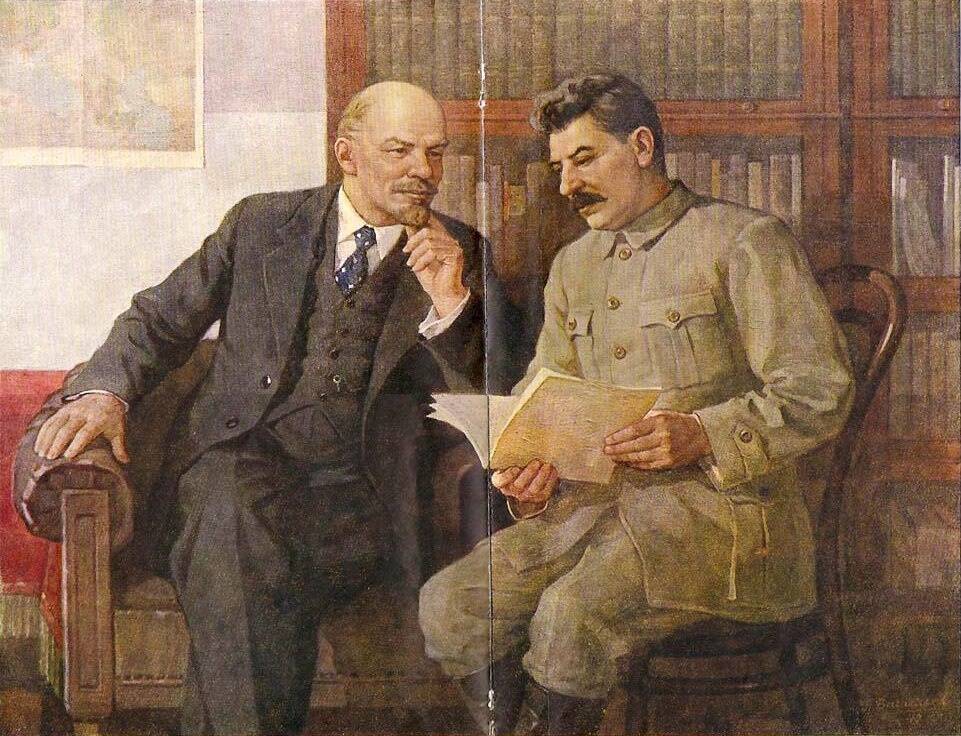主题: 为什么弗拉基米尔·列宁总是被视为一个好人,而约瑟夫·斯大林总是被视为一个坏人?
Why is Vladimir Lenin always viewed as a good person and Joseph Stalin always viewed as a bad person?
答主:Dima Vorobiev, Former Soviet propaganda executive
I would take “always” out of that statement. Lenin is often viewed in a more benign way than Stalin.
我要把这个表达里的“总是”一词拿走。与斯大林相比,列宁常常被以一种更温和的方式看待。
·Lenin belonged to the generation of revolutionary romantics, while Stalin was a relentless, pragmatic empire builder, hard as nail in his Machiavellian understanding of politics.
·列宁属于革命浪漫主义的一代人,而斯大林是一个苛刻、无情又务实的帝国建造者,和他马基雅维利主义的政治哲学一样冷酷无情。
·Lenin pioneered concentration camps for his own non-combatant compatriots, but they were not a feature of his rule, and were not as deadly as Stalin’s Gulag. He had a liking for hostage taking and summary executions. But Lenin was disarmingly straightforward about it. Meanwhile, Stalin went to great lengths to make his giant people-mower of state as unobtrusive and undocumented as possible—yet the sheer scale of human death and suffering caused by him makes him very hard to defend even for extreme fans of radical justice.
·列宁开创了用来关押他的平民同胞们的集中营,但这不是他的统治特点,而且也不像斯大林的古拉格那样致命。他喜欢扣留人质和从速处刑犯人。但是列宁对此坦率得令人佩服。与此同时,斯大林却竭尽全力让他巨大的国家杀人机器变得越隐蔽、越不留下文档越好——然而他所造成的大规模的人类苦难和死亡,让即便是激进正义的极端支持者也非常难以捍卫斯大林的立场。
·Stalin turned on his own party comrades, killing them in their thousands. Lenin didn’t do that even to people who he considered traitors to the proletarian cause.
·斯大林把火力转向他同党的同志,杀死了数以千计的党员。列宁甚至没有对被他认为是无产阶级事业的叛徒的人做这样的事。
·Lenin allowed factions in the party. You could disagree with the man on some fundamental things, and still sit on the Central Committee. (Modern cappuccino Communists, who never seem to agree with each other on anything, greatly appreciate that). With Stalin, doing the same was suicidal.
·列宁允许党内存在不同派系。你可以在一些非常重大的问题上反对他的同时,安然坐在中央委员会的位置上。(现在的那些看起来从未在任何事情上达成一致的“卡布奇诺式”共产主义者们非常赞赏这一点)对于斯大林,你做同样的事情就是想自杀。
·Lenin’s secret police Cheká was a loose bunch of marauding, sadistic, homicidal predators in revolutionary garbs who were good for terrorizing population and showing everyone who is in charge, but rarely for much else. The Kremlin had very scant control over who they were and what they were doing outside the inner circles of most trusted Bolsheviks. Stalin’s OGPU-NKVD-MGB-KGB was a huge, well-oiled, highly trained killing and spying machine kept by Stalin in good shape and on a very short leash—a beast rarely appreciated by revolutionary romantics.
·列宁的秘密警察“契卡”是在革命这一抓手下,聚集了一群四处抢劫、残酷成性、杀人如麻的掠食者的松散群体,它在恐吓人民、展现出谁在统治国家这方面很好用,但鲜少有其他作用。克里姆林宫对于除最核心、最可靠的布尔什维克圈子之外的什么人做了什么事的掌控能力非常不足。而斯大林的国家政治保卫总局——内务人民委员部——国家安全部——国家安全委员会是一个巨大、运转流畅、训练有素的暗杀和间谍机器。它由斯大林本人维系,精力充沛且限制极少,是一头极少受革命浪漫主义欣赏的猛兽。
·Lenin was a challenger, an underdog, a figure many of us can relate to. Stalin is known to history as a half-god moving around armies and industrial plants from the safety and comfort of the Kremlin. He’s an object of study, hate, admiration, but hardly someone you can imagine enjoying a cup of cappuccino with.
·列宁是一个挑战者,一个逆袭的黑马,一个许多人都可以共情的人。而斯大林在历史上则是在安全、舒适的克里姆林宫里调动军队和产业工厂的半身形象。他是学习、憎恨、仰慕的对象,但几乎不可能是一个你能想象和他一起喝一杯卡布奇诺的人。
The picture below shows the different images of Lenin and Stalin projected by the official Soviet propaganda, and now perpetuated by admirers of the Soviet Union and Bolshevism. Lenin is an extroverted, enthusiastic, articulate dreamer who carries you along with the power of his vision. Stalin is more of a Putin’s type of leader: introverted, calculating, perceptive wizard.
下图展示了苏联官方宣传中所展现的列宁和斯大林的不同形象,它如今依然长存在苏联和布尔什维克主义的支持者心中。列宁是一位外向、热情、善于表达的梦想家,依靠他观点的力量带着你前进;斯大林则更像是一位普京式的领导者:内向、精于计算、洞察力敏锐的巫师。
单词表
statement n. 表达
benign adj. 温和的
relentless adj. 苛刻无情的
pragmatic adj. 务实的
hard as nails 冷酷无情
pioneer v. 开辟(道路)
concentration camp n. 集中营
non-combatant n. 非军事人员
compatriot n. 同国人,同胞
feature n. 特点
liking n. 喜好
hostage n. 人质
take hostage 扣留人质
summary adj. 从速从简的
disarmingly adv. 使人消气地
straightforward adj. 坦率的
go to great lengths 竭尽全力
mower 割草机
unobtrusinve adj. 不张扬的
yet conj. 然而
sheer n. 十足的
scale n. 规模
radical n. 极端的
traitor n. 叛徒
proletarian adj. 无产阶级的
cause n. (为之奋斗的)事业
faction n. 派系
fundamental adj. 十分重大的,根本的
cappuccino n. 卡布奇诺咖啡
suicidal adj. 想自杀的
loose adj. 松散的
bunch n. (人的)群体
marauding adj. 到处抢劫的
sadistic adj. 残酷成性的
homicidal adj. 有杀人倾向的
predator n. 掠食者
terrorize v. 恐吓
scant adj. 不足的
inner adj. 接近中心的
OGPU 国家政治保卫总局
NKVD 内务人民委员部
MGB 国家安全部
KGB 国家安全委员会
well-oiled adj. 运转流畅的
in good shape 精神或身体状态好
leash n. 拴狗链,(比喻)约束
underdog n. 弱者,黑马
relate to 能够理解并同情
move arround 走来走去
industrial adj. 产业的
project v. 展现
perpetuate v. 使长久
extrovert adj. 性格外向的
enthusiastic adj. 热情的
articulate adj. 善于表达的
introverted adj. 性格内向的
perceptive adj. 有洞察力的
wizard n. 巫师
译自:https://qr.ae/prMXkk
时间:2018年6月12日